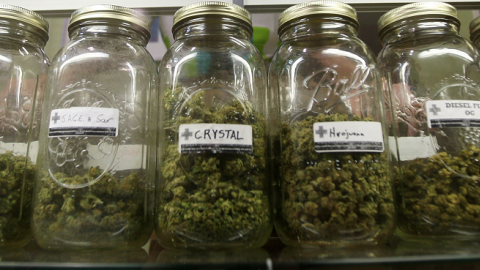The legalization of marijuana in Colorado and Washington has spawned reports of increased use, declining perceptions of risk, increased neonatal risk, drug tourism, diversion of public assistance to fund use, creation of significantly more powerful forms of the drug, and new financial rules to permit monies from drug sales to enter the banking system President Obama, moreover, proclaims marijuana use is no more dangerous than drinking or smoking tobacco—virtually assuring that the legalization of marijuana will be a defining domestic policy of his presidency. That is a matter for politics and history. A more pressing question for us is how families and communities can protect themselves from this unfolding debacle?
Marijuana legalization—and what some now suggest will be the legalization of all drugs—is dangerous, but not unstoppable. Indeed, the dangers can be turned against the forces of legalization. The new drug retailers are known businesses. They sell a dangerous, addictive product, and they need a substantial number of addicted users as their customer base to generate the profits they seek. In other words, addiction is not a byproduct, it is a business plan.
As these businesses grow more powerful, they deploy lobbyists to pressure government leaders to write laws that improve their bottom lines. Hence recent efforts to eliminate regulations that keep drug monies out of our banks. Legislation that improves the viability of these businesses also increases the number of stakeholders with an incentive to boost sales. Even one advocate of legalization admits there will be at least a 50-percent increase in use. This is a public health and safety catastrophe.
President Obama and some other intelligent Americans are to deny the overwhelming evidence demonstrating the harms of illegal drugs. Yet the harm caused by marijuana is clearer than ever, thanks to research conducted in recent years. Marijuana use is linked to diminished academic achievement, short-term memory loss, and impaired judgment It impedes motor skills and diminishes impulse control, which contributes to violent behavior and weakened self-control in general. Marijuana use worsens, and perhaps triggers, serious mental illness—including depression, psychosis, and suicidal thoughts and actions And marijuana users permanently increase their risk of addiction and perhaps the risk of addiction for their children (according to some of the latest research findings
For years, the federal government has reported that marijuana is the most prominent drug causing individuals to need treatment for addiction. Today, it is a source of more addiction referrals than all other illegal drugs combined. Of the roughly 7 million individuals the federal government estimates need treatment (almost certainly an undercount), over 4 million have a primary or exclusive dependence on marijuana. Moreover, marijuana dependence among teens exceeds even the dependence on alcohol, long more easily available and widely used.
With the open sale of formerly illegal drugs, the number of users will grow. Some advocates expect legalization to destroy criminal markets by providing cheaper drugs, which should also boost total sales. If the legal market does not produce discounts, however, the black market will continue to operate in parallel with the new higher-end market—a kind of “fast-food” network persisting alongside the new “gourmet” outlets. Either way, the result is increased use and increased profits.
But communities are not helpless before this onslaught. Even when the criminal law has been compromised at the state level, a resort to civil procedure may offer protection. Legal or illegal, marijuana injures users—researchers call it a “neurotoxin”—and those who distribute it for profit are liable for its known effects. Its production and distribution, after all are still Federal crimes. America’s tort attorneys could respond by suing drug retailers for the harm done by their product to particular addicts, then collecting damages for the clients and legal fees for themselves.
This approach would not depend on the president or federal, state, or local government policy. It would require only a victim, a drug trafficker, a capable lawyer, and a sympathetic jury. Some law firms could afford to take such cases as a pro bono service to families. They already see for themselves that growing drug addiction makes their communities unattractive to legitimate businesses. Philanthropies concerned about the disadvantaged could also push this initiative forward.
Some clever attorneys might partner directly with treatment providers for referrals. Others might advertise on billboards, busses, television and radio. They will find that YouTube and sites on the Internet are a vast repository of self-incrimination.
In addition, the retailers of marijuana as medicine—whether for smoking or eating baked goods, candy, and ice cream—should be easy targets of legal action. There is scant evidence of legitimate medical efficacy and much evidence that “medical marijuana” is a calculated fraud producing large profits. Far from approving it, the FDA has in fact written a letter denying smoked marijuana is medicine.
If you think trial lawyers made a windfall on tobacco, just wait until they get a handle on marijuana. The scientific and medical evidence against marijuana now dwarfs what we knew about tobacco at the time of the surgeon general’s report of 1964. No warning label in the world could shield marijuana growers and sellers from the tsunami of tort liability they should face from distributing a product with so many known harmful effects.
Everyone loves the tale of Robin Hood because it is a story of justice, taking from the oppressors and giving to the oppressed. That story is about to be reenacted with a drug dealing-retailer near you. The rule of law is a beautiful thing; it can protect our democracy in times of danger even when national leaders and government institutions fail.
















